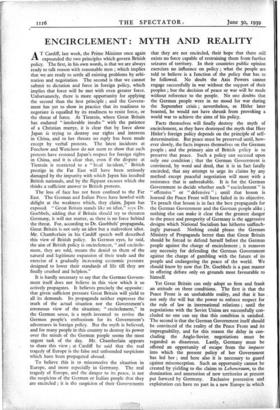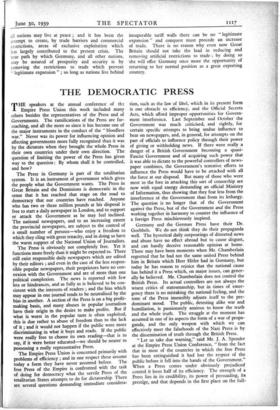ENCIRCLEMENT : MYTH AND REALITY
AT Cardiff, last week, the Prime Minister once again expounded the two principles which govern British policy. The first, in his own words, is that we are always ready to talk reason with reasonable men ; which implies that we are ready to settle all existing problems by arbi- tration and negotiation. The second is that we cannot submit to dictation and force in foreign policy, which implies that force will be met with even greater force. Unfortunately, there is more opportunity for applying the second than the first principle ; and the Govern- ment has yet to show in practice that its readiness to negotiate is equalled by its readiness to resist force, or the threat of force. At Tientsin, where Great Britain has endured " intolerable insults " with the patience of a Christian martyr, it is clear that by force alone Japan is trying to destroy our rights and interests in China, and to her threats no reply has been made except by verbal protests. The latest incidents at Foochow and Wenchow do not seem to show that such protests have restored Japan's respect for foreign rights in China, and it is clear that, even if the dispute at Tientsin is restricted to a " local incident," British prestige in the Far East will have been seriously damaged by the impunity with which Japan has insulted British nationals, and by the flippant excuses which she thinks a sufficient answer to British protests.
The loss of face has not been confined to the Far East. The German and Italian Press have howled with delight at the weakness which, they claim, Japan has exposed. " Great Britain stands like an idiot," says Dr. Goebbels, adding that if Britain should try to threaten Germany, it will not matter, as there is no force behind the threat. For, according to Dr. Goebbels' propaganda, Great Britain is not only an idiot but a malevolent idiot. Mr. Chamberlain in his Cardiff speech well described this view of British policy. In German eyes, he said, the aim of British policy is encirclement, " and encircle- ment, they are told, means the denial to them of the natural and legitimate expansion of their trade and the exercise of a gradually increasing economic pressure designed to lower their standards of life till they are finally crushed and helpless."
It is hardly necessary to say that the German Govern- ment itself does not believe in this view which it so actively propagates. It believes precisely the opposite : that given sufficient pressure Great Britain will yield to all its demands. Its propaganda neither expresses the truth of the actual situation nor the Government's erroneous view of the situation; " encirclement," in the German sense, is a myth invented to revive the German people's enthusiasm for its Government's adventures in foreign policy. But the myth is believed, and for many people in this country to destroy its power over the minds of the German people seems the most urgent task of the day. Mr. Chamberlain appears to share this view ; at Cardiff he said that the real tragedy of Europe is the false and unfounded suspicions which have been propagated abroad.
To believe this is to misconceive the situation in Europe, and more especially in Germany. The real tragedy of Europe, and the danger to its peace, is not the suspicion of the German or Italian people that they are encircled ; it is the suspicion of their Governments that they are not encircled, their hope that there still exists no force capable of restraining them from further seizures of territory. In their countries public opinion exercises no influence on policy ; what the people are told to believe is a function of the policy that has to be followed. No doubt the Axis Powers cannot engage successfully in war without the support of their peoples ; but the decision of peace or war will be made without reference to the people. No one doubts that the German people were in no mood for war during the September crisis ; nevertheless, as Hitler later boasted, he would not have shrunk from provoking a world war to achieve the aims of his policy.
Facts themselves will finally destroy the myth of encirclement, as they have destroyed the myth that Herr Hitler's foreign policy depends on the principle of self- determination. But peace must be preserved until, how- ever slowly, the facts impress themselves on the German people ; and the primary aim of British policy is to preserve that peace. Such a policy can succeed upon only one condition ; that the German Government is convinced, by word and deed, that it is in fact fatally encircled, that any attempt to urge its claims by any method except peaceful negotiation will meet with a resistance that is unbreakable. It is for the German Government to decide whether such " encirclement " is " offensive " or " defensive " ; until that lesson is learned the Peace Front will have failed in its objective. To preach that lesson is in fact the best propaganda for the German Government and the German people alike ; nothing else can make it clear that the greatest danger to the peace and prosperity of Germany is the aggressive designs which National Socialism has hitherto unflinch- ingly pursued. Nothing could please the German Ministry of Propaganda better than that Great Britain should be forced to defend herself before the German people against the charge of encirclement ; it removes any necessity for defending the German Government against the charge of gambling with the future of its people and endangering the peace of the world. We should know by now that Dr. Goebbels is a past master in offering debate only on grounds most favourable to himself.
Yet Great Britain can only adopt so firm and frank an attitude on three conditions. The first is that the Peace Front is an unshakable reality, and that it has not only the will but the power to enforce respect for the rule of law in international relations ; until the negotiations with the Soviet Union are successfully con- cluded no one can say that this condition is satisfied. The second is that the German Government itself should be convinced of the reality of the Peace Front and its impregnability, and for this reason the delay in con- cluding the Anglo-Soviet negotiations must be regarded as disastrous. Lastly, Germany must be offered an opportunity of escape from the impasse into which the present policy of her Government has led her ; and here also it is necessary to guard against misconception. Such an opportunity cannot be created by yielding to the claims to Lebensraum, to the domination and annexation of new territories at present put forward by Germany. Exclusive possession and exploitation can have no part in a new Europe in which all nations may live at peace ; and it has been the attempt to create, by trade barriers and commercial restrictions, areas of exclusive exploitation which has largely contributed to the present crisis. The true path by which Germany, and all other nations, may be assured of prosperity and security is by removing the restrictions to trade which prevent " legitimate expansion ; so long as nations live behind insuperable tariff walls there can be no " legitimate expansion " and conquest must precede an increase of trade. There is no reason why even now Great Britain should not take the lead in reducing and removing artificial restrictions to trade ; by doing so she will offer Germany once more the opportunity of returning to her normal position as a great exporting country.











































 Previous page
Previous page